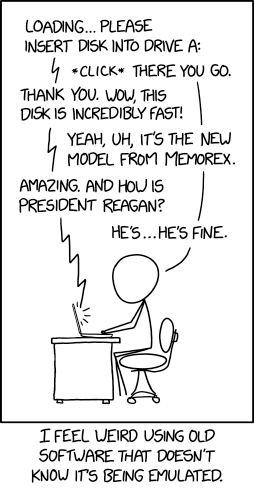I think I’m probably going to lose quite a lot of money in the next year or two. It’s partly AI’s fault, but not mostly. Nonetheless I’m mostly going to write about AI, because it intersects the technosphere, where I’ve lived for decades.
I’ve given up having a regular job. The family still has income but mostly we’re harvesting our savings, built up over decades in a well-paid profession. Which means that we are, willy-nilly, investors. And thus aware of the fever-dream finance landscape that is InvestorWorld.
The Larger Bubble
Put in the simplest way: Things have been too good for too long in InvestorWorld: low interest, high profits, the unending rocket rise of the Big-Tech sector, now with AI afterburners. Wile E. Coyote hasn’t actually run off the edge of the cliff yet, but there are just way more ways for things to go wrong than right in the immediate future.
If you want to dive a little deeper, The Economist has a sharp (but paywalled) take in Stockmarkets are booming. But the good times are unlikely to last. Their argument is that profits are overvalued by investors because, in recent years, they’ve always gone up. Mr Market ignores the fact that that at least some of those gleaming profits are artifacts of tax-slashing by right-wing governments.
That piece considers the observation that “Many investors hope that AI will ride to the rescue” and is politely skeptical.
Popping the bubble
My own feelings aren’t polite; closer to Yep, you are living in a Nvidia-led tech bubble by Brian Sozzi over at Yahoo! Finance.
Sozzi is fair, pointing out that this bubble feels different from the cannabis and crypto crazes; among other things, chipmakers and cloud providers are reporting big high-margin revenues for real actual products. But he hammers the central point: What we’re seeing is FOMO-driven dumb money thrown at technology where the people throwing the money have no hope of understanding. Just because everybody else is and because the GPTs and image generators have cool demos. Sozzi has the numbers, looking at valuations through standard old-as-dirt filters and shaking his head at what he sees.
What’s going to happen, I’m pretty sure, is that AI/ML will, inevitably, disappoint; in the financial sense I mean, probably doing some useful things, maybe even a lot, but not generating the kind of profit explosions that you’d need to justify the bubble. So it’ll pop, and my bet it is takes a bunch of the finance world with it. As bad as 2008? Nobody knows, but it wouldn’t surprise me.
The rest of this piece considers the issues facing AI/ML, with the goal of showing why I see it as a bubble-inflator and eventual bubble-popper.
First, a disclosure: I speak as an educated amateur. I’ve never gone much below the surface of the technology, never constructed a model or built model-processing software, or looked closely at the math. But I think the discussion below still works.
What’s good about AI/ML
Spoiler: I’m not the kind of burn-it-with-fire skeptic that I became around anything blockchain-flavored. It is clear that generative models manage to embed significant parts of the structure of language, of code, of pictures, of many things where that has previously not been the case. The understanding is sufficient to reliably accomplish the objective: Produce plausible output.
I’ve read enough Chomsky to believe that facility with language is a defining characteristic of intelligence. More than that, a necessary but not sufficient ingredient. I dunno if anyone will build an AGI in my lifetime, but I am confident that the task would remain beyond reach without the functions offered by today’s generative models.
Furthermore, I’m super impressed by something nobody else seems to talk about: Prompt parsing. Obviously, prompts are processed into a representation that reliably sends the model-traversal logic down substantially the right paths. The LLMbots of this world may regularly be crazy and/or just wrong, but they do consistently if not correctly address the substance of the prompt. There is seriously good natural-language engineering going on here that AI’s critics aren’t paying enough attention to.
So I have no patience with those who scoff at today’s technology, accusing it being a glorified Markov chain. Like the song says: Something’s happening here! (What it is ain’t exactly clear.)
It helps that in the late teens I saw neural-net pattern-matching at work on real-world problems from close up and developed serious respect for what that technology can do; An example is EC2’s Predictive Auto Scaling (and gosh, it looks like the competition has it too).
And recently, Adobe Lightroom has shipped a pretty awesome “Select Sky” feature. It makes my M2 MacBook Pro think hard for a second or two, but I rarely see it miss even an isolated scrap of sky off in the corner of the frame. It allows me, in a picture like this, to make the sky’s brightness echo the water’s.

And of course I’ve heard about success stories in radiology and other disciplines.
Thus, please don’t call me an “AI skeptic” or some such. There is a there there.
But…
Given that, why do I still think that the flood of money being thrown at this tech is dumb, and that most of it will be lost? Partly just because of that flood. When financial decision makers throw loads of money at things they don’t understand, lots of it is always lost.
In the Venture-Capital business, that’s an understood part of the business cycle; they’re looking to balance that out with a small number of 10x startup wins. But when big old insurance companies and airlines and so on are piling in and releasing effusive statements about building the company around some new tech voodoo, the outcome, in my experience, is very rarely good.
But let’s be specific.
Meaning
As I said above, I think the human mind has a large and important language-processing system. But that’s not all. It’s also a (slow, poorly-understood) computer, with access to a medium-large database of facts and recollections, an ultra-slow numeric processor, and a facilities for estimation, prediction, speculation, and invention. Let’s group all this stuff together and call it “meaning”.
Have a look at Climbing towards NLU: On Meaning, Form, and Understanding in the Age of Data by Emily Bender and Alexander Koller (July 2000). I don’t agree with all of it, and it addresses an earlier generation of generative models, but it’s very thought-provoking. It postulates the “Octopus Test”, a good variation on the bad old Chinese-Room analogy. It talks usefully about how human language acquisition works. A couple of quotes: “It is instructive to look at the past to appreciate this question. Computational linguistics has gone through many fashion cycles over the course of its history” and “In this paper, we have argued that in contrast to some current hype, meaning cannot be learned from form alone.”
I’m not saying these problems can’t be solved. Software systems can be equipped with databases of facts, and who knows, perhaps some day estimation, prediction, speculation, and invention. But it’s not going to be easy.
Difficulty
I think there’s a useful analogy between the stories AI and of self-driving cars. As I write this, Apple has apparently decided that generative AI is easier than shipping an autonomous car. I’m particularly sensitive to this analogy because back around 2010, as the first self-driving prototypes were coming into view, I predicted, loudly and in public, that this technology was about to become ubiquitous and turn the economy inside out. Ouch.
There’s a pattern: The technologies that really do change the world tend to have strings of successes, producing obvious benefits even in their earliest forms, to the extent that geeks load them in the back floor of organizations just to get shit done. As they say, “The CIO is the last to know.”
Contrast cryptocurrencies and blockchains, which limped along from year to year, always promising a brilliant future, never doing anything useful. As to the usefulness of self-driving technology, I still think it’s gonna get there, but it’s surrounded by a cloud of litigation.
Anyhow, anybody who thinks that it’ll be easy to teach “meaning” (as I described it above) to today’s generative AI is a fool, and you shouldn’t give them your money.
Money and carbon
Another big problem we’re not talking about enough is the cost of generative AI. Nature offers Generative AI’s environmental costs are soaring — and mostly secret. In a Mastodon thread, @Quixoticgeek@social.v.st says We need to talk about data centres, and includes a few hard and sobering numbers.
Short form: This shit is expensive, in dollars and in carbon load. Nvidia pulled in $60.9 billion in 2023, up 126% from the previous year, and is heading for a $100B/year run rate, while reporting a 75% margin.
Another thing these articles don’t mention is that building, deploying, and running generative-AI systems requires significant effort from a small group of people who now apparently constitute the world’s highest-paid cadre of engineers. And good luck trying to hire one if you’re a mainstream company where IT is a cost center.
All this means that for the technology to succeed, it not only has to do something useful, but people and businesses will have to be ready to pay a significantly high price for that something.
I’m not saying that there’s nothing that qualifies, but I am betting that it’s not in ad-supported territory.
Also, it’s going to have to deal with pushback from unreasonable climate-change resisters like, for example, me.
Anyhow…
I kind of flipped out, and was motivated to finish this blog piece, when I saw this: “UK government wants to use AI to cut civil service jobs: Yes, you read that right.” The idea — to have citizen input processed and responded to by an LLM — is hideously toxic and broken; and usefully reveals the kind of thinking that makes morally crippled leaders all across our system love this technology.
The road ahead looks bumpy from where I sit. And when the business community wakes up and realizes that replacing people with shitty technology doesn’t show up as a positive on the financials after you factor in the consequences of customer rage, that’s when the hot air gushes out of the bubble.
It might not take big chunks of InvestorWorld with it. But I’m betting it does.




